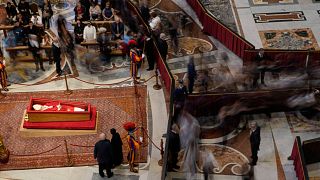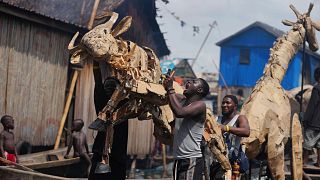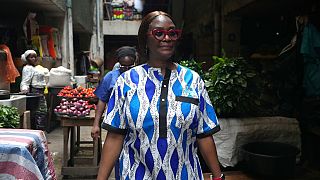Nigeria
In parts of the world, religiously unaffiliated people are increasing in numbers, and can safely and publicly be an atheist or agnostic. In countries like Nigeria, the situation is starkly different.
The Associated Press spoke to seven nonbelievers to document their experiences. Most spoke anonymously and in secret locations over concerns for their safety.
“It has not been easy. I have faced a lot of challenges,” said an anonymous atheist from Geshua, Nigeria. “One of them is people can't really understand the fact that an entire human being, will just wake up and say he or she doesn't believe in God”.
Nonbelievers in Nigeria said they have been perennially treated as second-class citizens in the deeply religious African country.
Its population of 210 million is almost evenly divided between Christians dominant in the south and Muslims who are the majority in the north.
When he was young, the atheist from Genshua was sent to the madrassa, or Islamic school. He recalls that many of his classmates felt changed after learning of the tawheed, or the attributes of Allah and his oneness, but he did not.
“I can say that I have been an atheist all my life,” he said. “In 2017, I came across a piece of writing that addressed the topic of existence and nonexistence of Allah and any other God, in a just way. And I feel connected to the texts, in a way that I have never felt connected to any story I was told about the existence of God”.
In 2019, the man said he was forced from his home when his uncle found out he belonged to an atheist group on WhatsApp, prompting death threats. He returned home only after pretending to be a practicing Muslim even though he remained a closeted atheist.
Some nonbelievers say threats and attacks have worsened in the north since the leader of the Humanist Association of Nigeria, Mubarak Bala, was jailed for blasphemy against Islam last year.
Almost half of the countries in Africa, including Nigeria, have statutes outlawing blasphemy. In most secular courts in Nigeria, the stiffest penalty for a blasphemy charge is two years in prison, while it carries a death penalty in the Islamic courts active in the north.
At least three people have been killed for alleged blasphemy in northern Nigeria in the past year. The latest victim was a Muslim stoned to death in June after being accused of blaspheming Islam during an argument at a market. Those who stoned him included children, according to a video reviewed by the AP.
“My biggest fear as an atheist living in northern Nigeria is this, I don't want to get known to be an atheist and get killed or lynched in the street,” said the atheist.
In another northern region of Nigeria, Kano State, a young man said he became an atheist after reading a Facebook post made by Bala.
“Since the conviction of Mubarak Bala, whenever I am in the midst of people that know me, and it is time for prayer, I will just go and pray with them. Not because I believe in the religion of Islam, but for my safety and the safety of my family,” said the anonymous atheist in Kano State.
He believes if he ever came out as an atheist in northern Nigeria, it would be a death sentence for him and possibly his family.
Associated Press reporter, Chinedu Asadu, who took extreme measures to ensure the safety of the interviewees, also spoke with atheists in southern Nigeria, in Lagos.
The Nigerian Humanist Association, now run by Leo Igwe, a founder, are struggling with unprecedented threats to members and have gone underground, no longer holding meetings.
But a small group of members met in Lagos to talk with The Associated Press.
“There was a time where a lot of people called a family meeting. They were like, you know, I put on my social media about my religious beliefs, and they were like, Oh, what if some people try to attack you and they just put the fear in me,” said Olawande Odukoya, an atheist. “And I think that's because they want me to have a change of mind. But, you know, my mind is made up. There's nothing anybody can do about it. I am an atheist, and it is what it is”.
Igwe feels that because of their social upbringing in Nigeria, atheism is treated as taboo and often demonized.
“People preach against it,” he said. “You are made to understand that it's something evil and you know it is always difficult for people to kind of break away from their socialization. It takes a lot of courage. It takes a lot of intellectual courage.”
Currently imprisoned in the northern state of Kano, Bala remains resolute as a humanist despite his experiences since April 2020 when he was arrested, though he worries about the safety of his family and the humanists he leads in Nigeria.











Go to video
Funeral held in Kenya for TikTok content moderator
02:19
Ethiopians in Washington D.C. keep ancient language and orthodox traditions alive
01:09
Yinka Shonibare explores identity and hybridity in new Madagascar exhibition
02:15
Catholic women strike against the "glass ceiling" in the Catholic Church
Go to video
Lassa fever kills 118 in Nigeria since the start of the year
Go to video
Pics of the day: March 31, 2025